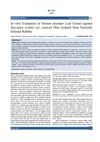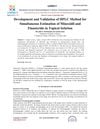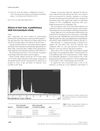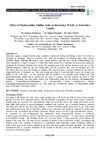 19 citations,
July 2018 in “Mechanisms of Ageing and Development”
19 citations,
July 2018 in “Mechanisms of Ageing and Development” Eating less can slow aging and help keep stem cells healthy by cleaning out damaged cell parts.
 1 citations,
January 2022 in “Turkiye Klinikleri Journal of Dermatology”
1 citations,
January 2022 in “Turkiye Klinikleri Journal of Dermatology” Lifestyle changes during the early COVID-19 outbreak led to more cases of acne and other skin conditions, but fewer cases of rosacea and skin infections.
 January 2024 in “Indian Journal of Animal Research”
January 2024 in “Indian Journal of Animal Research” Nerium oleander leaf extract effectively kills scabies mites in rabbits.
 January 2019 in “Przegląd Dermatologiczny”
January 2019 in “Przegląd Dermatologiczny” An 87-year-old woman was diagnosed with type 3 autoimmune polyendocrine syndrome and had multiple autoimmune issues.
18 citations,
January 1978 in “Advances in experimental medicine and biology” Hair cystine levels may indicate protein malnutrition, but more research is needed.
 31 citations,
September 2006 in “International journal of gynaecology and obstetrics”
31 citations,
September 2006 in “International journal of gynaecology and obstetrics” New treatments for PCOS focus on insulin resistance and reducing testosterone levels, along with traditional hormone therapies.
 September 2023 in “Deleted Journal”
September 2023 in “Deleted Journal” Lifestyle changes improve reproductive function and hormonal balance in obese women with PCOS.
 1 citations,
October 2021 in “Prilozi - Makedonska akademija na naukite i umetnostite. Oddelenie za medicinski nauki”
1 citations,
October 2021 in “Prilozi - Makedonska akademija na naukite i umetnostite. Oddelenie za medicinski nauki” Many women with polycystic ovary syndrome have normal blood sugar, but some may have higher blood sugar levels or diabetes, especially if they are older, overweight, and have certain hormone levels.
 15 citations,
July 2015 in “Journal of Essential Oil Bearing Plants”
15 citations,
July 2015 in “Journal of Essential Oil Bearing Plants” Thuja orientalis and Thuja occidentalis essential oils have medicinal properties useful for developing treatments with antimicrobial and bioactive effects.
 April 2017 in “Journal of Investigative Dermatology”
April 2017 in “Journal of Investigative Dermatology” Fisetin may help treat psoriasis and reduce skin inflammation.
13 citations,
April 2019 in “International journal of molecular sciences” Acyzol could help treat conditions caused by zinc deficiency.
 December 2023 in “International Journal of Advanced Research in Science, Communication and Technology”
December 2023 in “International Journal of Advanced Research in Science, Communication and Technology” A reliable method was created to measure Minoxidil and Finasteride in a solution.
 46 citations,
June 2015 in “Fertility and Sterility”
46 citations,
June 2015 in “Fertility and Sterility” Insulin resistance is significantly linked to a higher risk of depression in women with PCOS.
 45 citations,
February 2018 in “Journal of basic and clinical physiology and pharmacology/Journal of basic & clinical physiology & pharmacology”
45 citations,
February 2018 in “Journal of basic and clinical physiology and pharmacology/Journal of basic & clinical physiology & pharmacology” *Acorus calamus* has many medicinal benefits but needs more safety research.
 December 2023 in “Frontiers in microbiology”
December 2023 in “Frontiers in microbiology” Mannan oligosaccharides improve raccoon dogs' fur quality and overall health.
 January 2024 in “Journal of dermatology and skin science”
January 2024 in “Journal of dermatology and skin science” Topical aprepitant reduces skin rash and hair loss caused by cancer treatment.
 12 citations,
March 2015 in “Pediatric Dermatology”
12 citations,
March 2015 in “Pediatric Dermatology” Early diagnosis and treatment of PCOS in young people is important to prevent long-term health problems.
 April 2023 in “Tikrit journal of pharmaceutical sciences”
April 2023 in “Tikrit journal of pharmaceutical sciences” Ginger extract helps hair growth and reduces the need for prednisolone in alopecia areata patients.
Polyglutamic acid is a valuable, sustainable ingredient for skincare and haircare products.
 1 citations,
February 2016 in “Revista Brasileira de Ginecologia e Obstetrícia”
1 citations,
February 2016 in “Revista Brasileira de Ginecologia e Obstetrícia” High Lipid Accumulation Product levels are linked to more hirsutism in women with Polycystic Ovary Syndrome.
 4 citations,
February 2007 in “Journal of the European Academy of Dermatology and Venereology”
4 citations,
February 2007 in “Journal of the European Academy of Dermatology and Venereology” The study suggests silicon might be important for healthy hair, as less silicon was found in people with hair loss.

 10 citations,
April 2020 in “Clinics in Dermatology”
10 citations,
April 2020 in “Clinics in Dermatology” Biotin supplements improved skin and hair problems in a girl with biotinidase deficiency.
1 citations,
February 2022 in “Journal of the American Academy of Dermatology” Taking biotin supplements can be risky and often lacks evidence of effectiveness for skin, hair, and nail issues.
 July 2017 in “International journal of Ayurvedic and herbal medicine”
July 2017 in “International journal of Ayurvedic and herbal medicine” Madayantika Siddha Taila is effective for treating Seborrhea capitis.





















